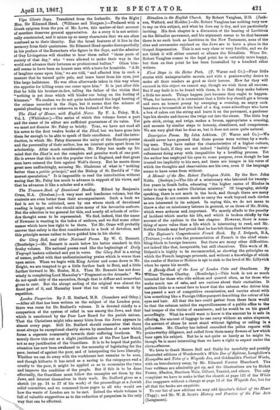A Bandy-Book of the Law of London Cabs and Omnibuses.
By William Thomas Charley. (Routledge.)—This book is not so much intended for those who ride seldom and quarrel often, as for those who make mach use of cabs, and are curious about their curiosities. It matters little to a casual faro to know that the cabman who drives him has passed a sort of competitive examination, and carries about with him something like a Foreign Office passport describing the colour of his eyes and hair. All that the fare could gather from these facts would be that the cabman united the superciliousness of a public office to the bad temper of the victim of examiners; and he would be on his guard accordingly. What he would want to know is the amount he is safe in offering, the amount of luggage he can carry without an extra sixpence, the amount of abuse he must stand without fighting or calling in a policeman. Mr. Charley has indeed consulted the police reports with praiseworthy diligence, and culled from them many flowers of law which bear upon his subject. But he is not quite as handy as he might be, though he is more interesting than we have a right to expect under the circuustances.
We have to thank Messrs. Bell and Daldy for tastefully and prettily illustrated editions of Wordsworth's White Doe of Rylstone, Longfellow'e Evangeke and Tales of a Wayside Inn, and Goldsmith's Poetical Works, with an introductory essay, by Mr. Edmund Forster Blanchard. The four volatnes are admirably got up, and the illustrations are by Birket Foster, Absolon, Harrison Weir, Gilbert, Tenniel, and others. The only complaint we have to make is that the church at page 121 of the White Doe reappears without a change at page 13 of the Wayside Inn, but for all that the books are exquisite.
To our list of new editions we may add Quarles's School of the Heart (Tegg); and Mr. W. B. Scott's History and Practice of the Fine Arts (Longmans).






























 Previous page
Previous page